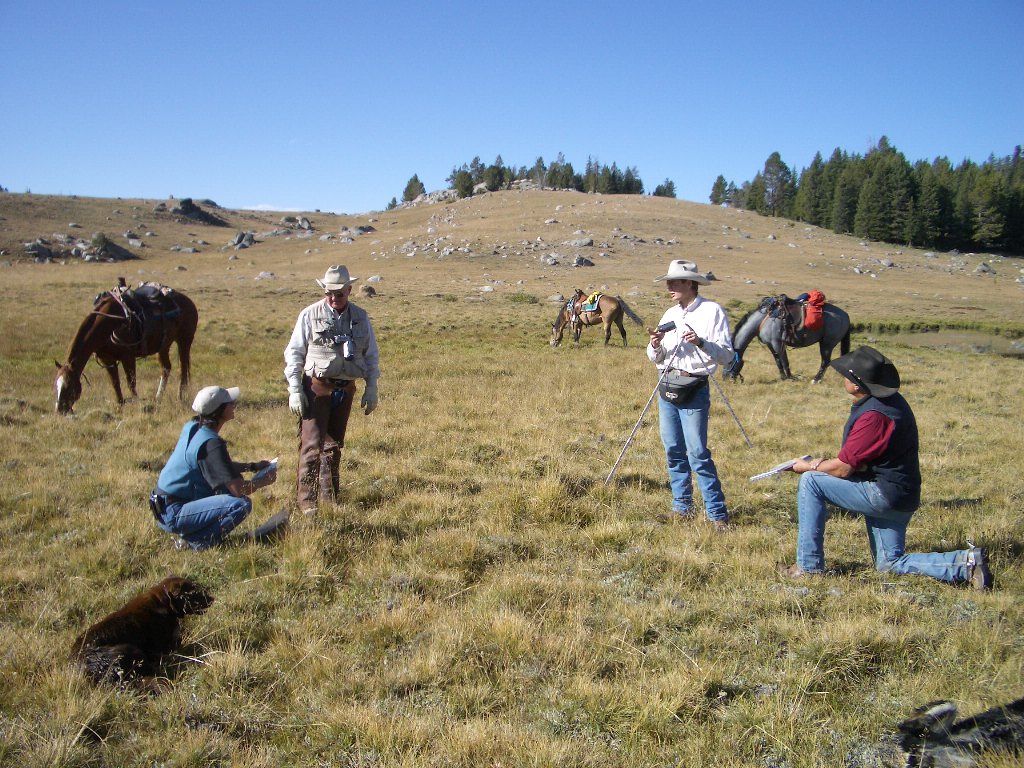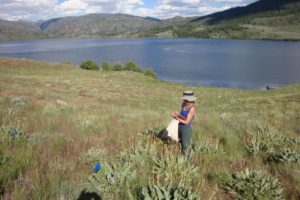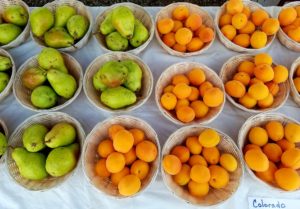
Colorado State University Extension, in partnership with the colleges of Liberal Arts, Agricultural Sciences, and Veterinary Medicine and Biomedical Sciences, will be hosting summer interns who will work in a variety of locations around the state.
“We are very excited about the opportunity to foster opportunities that promote campus/county-based Extension connections,” said Becca Jablonski, coordinator of the effort. “Our goal is to help students engage in applied research that helps communities and enriches their University experience, while elevating the great work already taking place in Extension offices across the state.” Jablonski is an assistant professor and Food Systems Extension Economist in the Department of Agricultural and Resource Economics.
The 10-week internship combines research, program delivery and dissemination efforts with hands-on learning at the local/county level. Work culminates in a final poster presentation on campus at the Extension Fall Forum, sponsored by the CSU Graduate School, held the week of Oct. 22.
A 16-person committee, made up of college faculty and Extension specialists, staff and administrators, found that a common thread throughout the process of developing this program is the understanding that internships and experiences working in county offices lead to developing future Extension staff, including enhanced understanding of what a career in Extension means.
The applicant pool consisted of 39 rising sophomores, juniors, seniors, and graduate students. There were four students selected from Liberal Arts, five from Agricultural Sciences, and two from the College of Veterinary Medicine and Biomedical Sciences.
In-depth experience for DVM students
Emily Eckhart, finishing her sophomore year in the veterinary program, will be working on avian health issues. Eckhart completed the Integrated Resource Management master’s degree in animal science before starting vet school.
“This internship is designed to give Emily an in-depth experience in avian health and production issues in Colorado,” said Ragan Adams, D.V.M., coordinator for these two internships. “It fits well with her goal of establishing a rural practice with a growing need to understand poultry.”
Time will be split between working with CSU Avian Health Team and with county Extension personnel to visit a variety of backyard poultry flocks, 4-H poultry groups, and small flock producers in Front Range counties. She’ll also work with Extension agricultural economists and food safety specialists who advise small flock poultry producers, as well as poultry producers selling meat and eggs at farmer’s markets and through distribution to Community Supported Agriculture (CSA) members.
Adam Huey is a freshman veterinary student who will be providing support for the Extension Animal Disaster Planning and Response Team. Huey was an Army Ranger medic deployed three times to Afghanistan. He is interested in working on community animal issues at all levels.
“This internship will help Huey understand the complexity of challenges regarding animal disaster planning and response,” said Adams. “Depending on what happens this summer, he could be working in a variety of scenarios.”
Huey will be assisting J.D. Sexton, CSU Extension agent in Logan County, as he develops his county animal response plan, which will include developing information for county residents on animal carcass disposal. Huey will also be working with Jennifer Tucker, CSU Extension agent in Adams County, to organize and train a community animal response team. Additionally, he will assist personnel in the veterinary office of the Colorado Department of Agriculture on state disaster planning and response.
College of Liberal Arts internships
Audience analysis and communication research
Madison Tatum (Economics) will be working with mentors Kerri Rollins and Sue Schneider (Larimer County Extension), Katie Abrams (Journalism and Media Communication), and Joanne Littlefield (Extension Outreach and Engagement) to support marketing and communications research and delivery. The goal is to find opportunities to communicate the value of Extension ro more diverse audiences.
Community development
Carter Hill (Political Science) will work with mentors Samantha Jager (Park County Extension) and Michael Carolan (Sociology) to plan and implement an after-school program, as well as support general opportunities for community development.
Rapid rangeland health assessment focusing on vegetative and soil data
Kristin Maxwell (Languages, Literatures, and Cultures) will work with mentors Libby Christensen (Routt County Extension), Ryan Rhodes (Animal Sciences), Meagan Schpanski (Soil and Crops), Paul Meiman (Forest and Rangeland Stewardship), Kevin Jablonski (Forest and Rangeland Stewardship), Retta Breugger (Western Region Extension Rangeland Specialist), and John Rizza (Western Region Extension Small  Acreage/NRCS) in Routt County on issues of rangeland health.
Acreage/NRCS) in Routt County on issues of rangeland health.
The need for land use managers, who often lack timely, relevant, and accessible data to make evidence-based decisions on forest and rangeland resource concerns, is the driver behind this internship. Maxwell will work with the team on data collection which will be fed into a modeling being developed on-campus. This, in turn, will allow for better decision-making tools.
“The work Kristin will do for us this summer will help us understand the relationships between urban food initiatives and rural provisioning producers and their communities,” said internship coordinator Libby Christensen. “At the same time, there is growing interest across the state in building a dynamic and resilient food system,” said Christensen. Rangeland management plays an integral role in Colorado’s food system, yet its relation to the broader food systems is not well understood.
Tri River Area education and hunger relief
Aisha Martinek (Interdisciplinary Liberal Arts) will work with mentors Ann Duncan (Tri River Area Extension Family and Consumer Sciences), Amanda McQuade (Western Research Center), Josh Sbicca (Sociology) to evaluate the nutrition education program’s efficacy in achieving its desired outcomes, and provide information to community partners.
Agricultural Sciences internships
Arkansas Valley
Chance Guardamondo (Soil and Crop Sciences) will work with mentors Mike Bartolo (Arkansas Valley Research Center), Alan Andales (Soil and Crops), and Bruce Fickenscher (Southeast Area Extension) in the Arkansas Valley on agricultural production issues.
Front Range farmers markets
 Nicole Didero (Department of Agricultural and Resource Economics) will work with mentors Martha Sullins (Front Range Extension), Dan Mooney (DARE), and Becca Jablonski (DARE) to collect market price information and support programming for agents and producers on how prices change throughout the season by geography, certification, and time of year. This work can help to improve market channel selection for beginning farmers and ranchers.
Nicole Didero (Department of Agricultural and Resource Economics) will work with mentors Martha Sullins (Front Range Extension), Dan Mooney (DARE), and Becca Jablonski (DARE) to collect market price information and support programming for agents and producers on how prices change throughout the season by geography, certification, and time of year. This work can help to improve market channel selection for beginning farmers and ranchers.
Golden Plains (Akron) youth development
Ashley Krumpelmann, (Master of Extension Education Online), will work the mentor Dennis Kaan (Golden Plains Area Extension director) on youth development projects in the Golden Plains area.
San Luis Valley (Monte Vista) potatoes and health
Sahar Toulabi (Horticulture and Landscape Architecture) will work with mentors Marvin Reynolds (San Luis Valley Area Extension), Eric McPhail (Gunnison County Extension), Adam Heuberger (Horticulture and Landscape Architecture), and David Holm (San Luis Valley Research Center) to synthesize information from the Crops for Health Program relevant to commercially viable potato varieties in Colorado.
Toulabi will learn how to synthesize research across disciplines. She will also learn how to disseminate research effectively to diverse stakeholders and be responsible for developing materials for stakeholder audiences that help to bridge the knowledge gap between potato varieties and health outcomes. Integrating opportunities to support improved health outcomes with economic development, particularly that promotes Colorado farms and ranches, was identified as part of the state’s Colorado Blueprint of Food and Agriculture.
Western Region (Grand Junction or Fruita) local food systems
Tabitha Covey (Horticulture and Landscape Architecture) will work with mentors Perry Cabot (Extension and AES), and Mark Uchanski (Horticulture and Landscape Architecture) to describe supply chains for key commodities, including profitability of crops or cropping systems, and disseminate findings to local growers and key stakeholders.
“Tabitha’s work with the CSU Food Systems Team on campus is a real plus for this project,” said Perry Cabot, one of the coordinators of this internship. She will expand that work to include the faculty and staff at the Western Colorado Research Centers. “We hope to identify a local food scenario to model. For example, strawberries could be identified as a crop of interest due to their relatively high value.”
One objective of the internship will be to describe those supply chain impacts, including profitability of crops or cropping systems (e.g. organic) that build into the profit margins the increased cost of transport to likely markets (e.g. Denver, Salt Lake City, and regional markets).
There will be opportunity to establish demonstration plot(s) as part of the internship experience. This could include irrigation technologies, specialty crop plots, or variety trials and can be used for Extension activities around these topics.